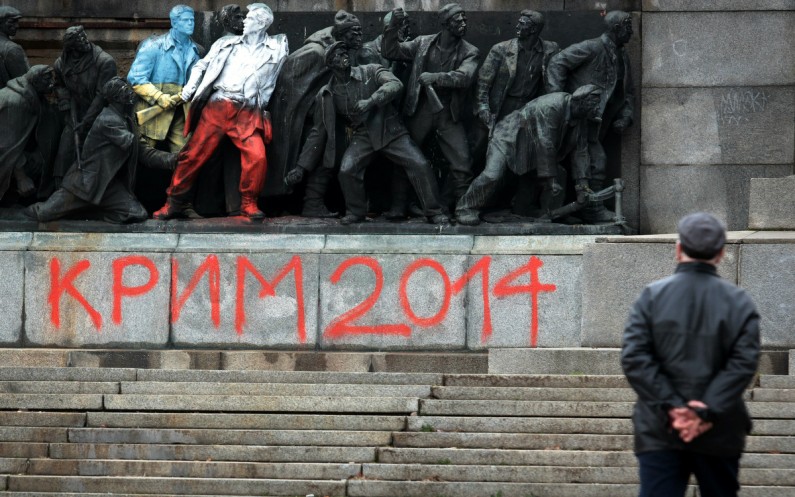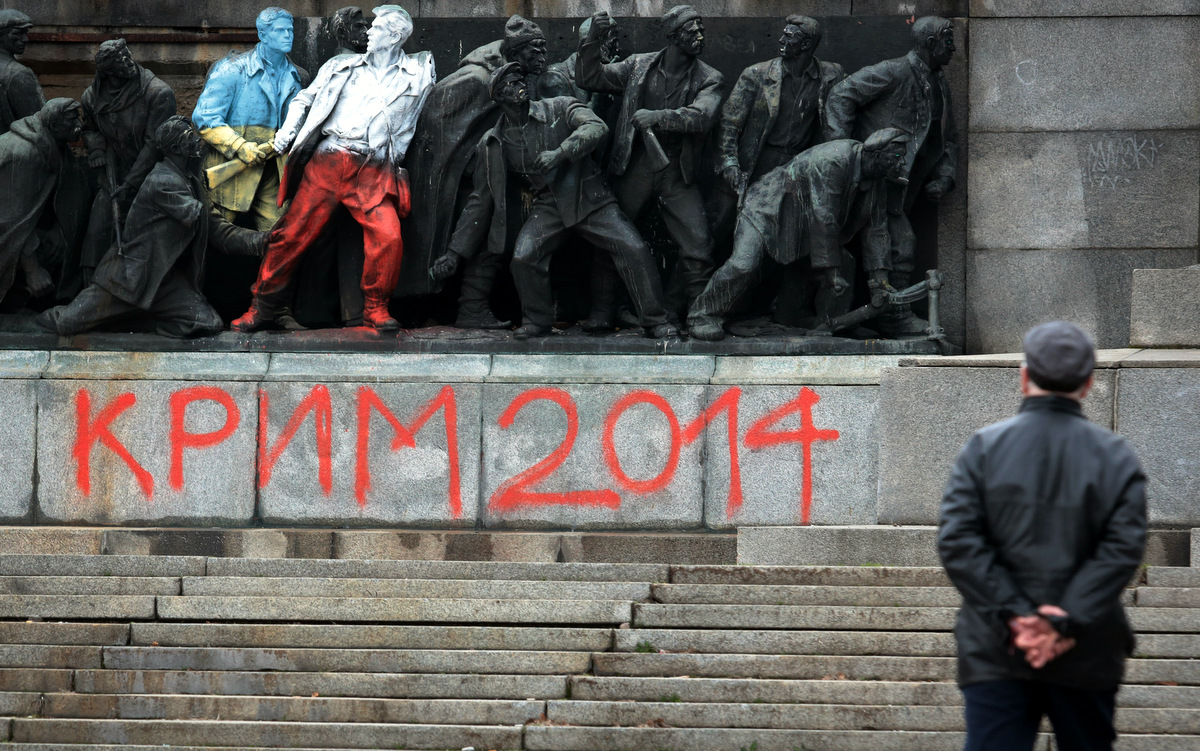
In a referendum that left Crimeans with only two choices — join Russia or declare Crimea an independent nation — an overwhelming majority of those that voted chose the former on Sunday. This has triggered a cascading array of new fights, complications and declarations, all of which threaten to redefine international economic policy for years to come.
One of these new fights centers around the issue of conditionalities in possible assistance to Ukraine from the International Monetary Fund. In a House Foreign Affairs Committee hearing on March 6, Deputy Assistant Secretary ot the Treasury for Europe and Eurasia Deelap Singh spoke of the “urgency” for Ukraine to embrace IMF-dictated reforms or conditionalities to “remove imbalances within its economy,” including an introduction of austerity measures into Ukrainian fiscal spending, cutbacks in energy subsidies to reduce Ukraine’s consumption of natural gas and a devaluation of the Ukrainian currency, the hryvnia.
“Only the IMF has the capacity to design and support a reform agenda” in Ukraine, Singh said. The imposition of conditionality, a guarantee mechanism imposed on IMF loans in lieu of collateral and a key component of the IMF system since the Bretton Woods Conference of 1944, has grown to be a reflection of American demands on the loan’s receiver.
While these conditionalities are being seen as necessary for Ukraine’s economic recovery, they mirror the same conditionalities imposed on Greece by the European Central Bank and the IMF. In reality, the conditionalities reflect a lack of confidence in Ukraine’s ability to recover, given the nation’s history of corruption, shortfalls in production and exports and its 37-percent increase in gas purchasing. While such conditionalities may represent a hard pill to swallow for the Ukrainian people, Kiev has indicated a willingness to make the requested changes.
Beyond the conditionalities, questions of the United States’ willingness to agree to new borrowing and lending reforms for the IMF may reflect a situation in which a shortage of international assistance could force Ukraine to submit to Russia — a situation most in the West would consider wholly unacceptable and opposed to the West’s intentions for Ukraine.
The U.S. and conditionality
The U.S., which offers over than two-and-a-half times more IMF contributions than the second-largest contributor, Japan, controls 16.75 percent of the IMF’s votes. This has led to the world’s economy switching to neoliberalism at the same time the U.S.’s economy switched. It has also contributed to the perception that nations friendly with the U.S. tend to get bigger loans with less conditions, while nations that the U.S. perceives to be hurting its national interest tend to get snubbed. Typically, a country that receives American aid is also likely to receive IMF aid.
This has created a credibility crisis for the IMF, in which many in the international community see the IMF as no more than an arm of the U.S. State Department. One such example is the botched response to the 1997-98 Asian Financial Crisis, which resulted in many Western investors receiving bailouts from East Asian governments. Many feel that the IMF’s attempts to salvage European and American interests while leaving the governments ravished were part of a larger, intentional scheme.
Many, however, also feel that the IMF’s position is not strong enough to assert its will upon Ukraine. With a debt-to-gross domestic product ratio of just 40 percent, Ukraine is currently more debt-stable than most of the Western world — including the U.S.
With $3 billion in foreign currency bonds due by the end of September, $3 billion owed to Russia and the fear that investors may be scared off by the increasing tensions in the nation, Ukraine — despite having capital in hand — has been forced to reluctantly seek help in restructuring its debt. The country has asked for at least $15 billion in loans.
The $3 billion Russian loan — part of a $15 billion package negotiated by former Ukrainian President Viktor Yanukovych — has equal status to Ukraine’s eurobonds, meaning that if Ukraine pays off its eurobonds, it must also pay off the Russian loan. In addition, the Russian loan becomes immediately payable should Ukraine’s debt-to-GDP ratio exceed 60 percent.
Ukraine may now be at the center of a West vs. East tug-of-war. For a country saddled with $3 billion in guaranteed-payment Russian funds, any assurance of assistance from the West ensures repayment to Russia. Agreeing to accept more Russian funds may be de facto consent by the Ukrainian government for Russia’s seizure of Crimea and could be the first step of re-installing a pro-Russian government in Kiev, which would show the West to be weak. Finally, the fine balancing act between ensuring the flow of natural gas from Russia to Western Europe and sanctioning Russia demands that the IMF take a nuanced approach to intervening in Ukraine.
“We are seeing East against West, which makes it more difficult for the IMF,” said Zsolt Papp, who helps oversee $2.6 billion of emerging-market debt at Union Bancaire Privee in Zurich. “Ukraine is just the pawn here.”
The IMF and partisan politics
The IMF’s inability to act in Ukraine also centers around another fight that has emerged in Washington, where House Republicans are blocking efforts to reform the IMF. In question is a 2010 G20 agreement that would double the financial commitment each country makes to the fund, which would expand the IMF’s lending capabilities. According to the Congressional Research Service, the impact of this change will be miniscule to the U.S.
“Implementing the reforms would not increase total U.S. financial commitments to the IMF and would have little impact on U.S. representation at the IMF,” read the CRS report, “IMF Reforms: Issues for Congress.” The reforms would require transferring some U.S. financial commitments from a supplementary fund at the IMF (the ‘New Arrangements to Borrow,’ or NAB) to the IMF’s core source of funding (quota).
“The share of U.S. voting power at the IMF would fall slightly, but the United States would still maintain its unique veto power over major policy decisions,” the report continued.
Despite the fact that the reforms would not significantly change the country’s financial obligation to the IMF, the Senate Republicans attempted in January to use the passage of the IMF reforms as a bargaining chip to convince the Democrats to block a Treasury rule permitting the Internal Revenue Service to curb political activities by tax-exempt groups. The Democrats did not take the bait and the reforms sit unpassed today.
The House has passed $1 billion in loan guarantees for Ukraine. The Republican leadership has presented a unified front that increasing the IMF quota will affect the nation’s capabilities in supporting Ukraine. “Let’s make sure we all understand something: The IMF money has nothing to do with Ukraine,” said Speaker of the House John Boehner (R-Ohio).
The House Republicans have taken umbrage to attempts to pay for the Congressional Budget Office’s projected cost of the IMF reforms, estimated at about $315 million. A Senate proposal would pay for a portion of this cost from military accounts.
Broken leadership
The U.S. is the only nation that has not approved the reforms. For an organization that has jumped — for the last half-century — at every demand the U.S. has made, the impact of this to the IMF cannot be overstated.
“Our leadership in this is now in doubt,” Secretary of State John Kerry told a Senate appropriations subcommittee last week. “We’re inadvertently hurting ourselves by sending a message that we’re not prepared to lead.”
No one doubts that offering IMF money to Ukraine is an attempt for the world’s most powerful nations to directly influence a former soviet republic to become a permanent Western ally — a major coup in regards to West-East relations.
Others, notably Michel Chossudovsky, director of the Centre for Research on Globalization, have argued that the U.S. and the West have been playing a role in bringing Ukraine to the West with their encouragement of the Euromaidan protests and that the protests amounted to a “coup d’etat” to remove an officially elected government.


